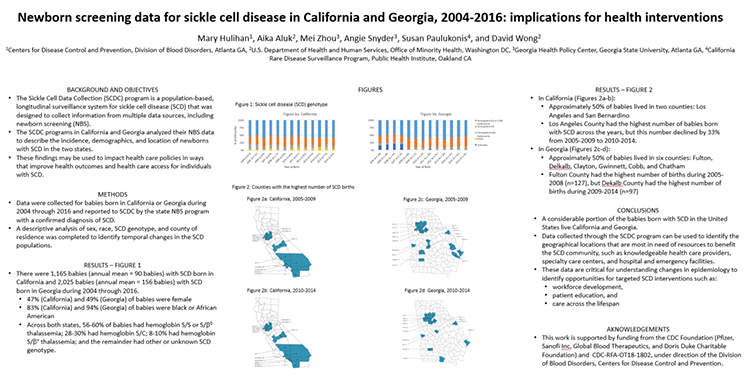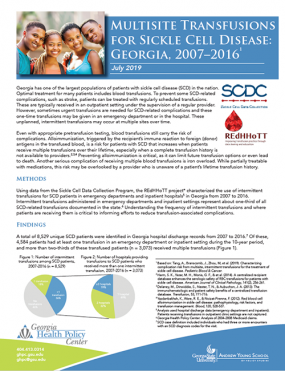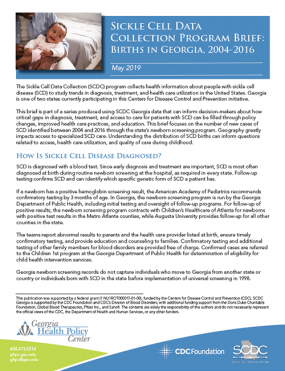The Bloodline Newsletter: Summer 2019

Mission: To improve quality of life, life expectancy, and health among people living with sickle cell disease (SCD).
Summer 2019
Communications Corner
- September Sickle Cell Awareness Month: CDC will share educational materials on transition & back-to-school, diversity among the SCD community, transfusions, and SCD surveillance.
- Check out these resources:
- CDC’s updated SCDC program website.
- SCDC Georgia’s brief, Multisite Transfusions for Sickle Cell Disease: Georgia, 2007–2016
- SCDC Georgia’s brief, Births in Georgia, 2004–2016.
Recent Publications
SCDC Georgia published, ”Characterizing complication risk from multisite, intermittent transfusions for the treatment of sickle cell disease“ in Pediatric Blood & Cancer.
SCDC California published, “Acute care utilization at end-of-life in sickle cell disease: Highlighting the need for a palliative approach to sickle cell disease” in Journal of Pain and Symptom Management.
Up-to-Data
- SCDC Georgia data have been cleaned and merged for all data sources through 2016.
- SCDC California’s 2010–2016 annual reports are now available.
- SCDC California recently received new clinical data sets from University of California San Diego/Rady Children’s Hospital, Zuckerberg San Francisco General Hospital, and the Center for Inherited Blood Disorders. These data will help to better understand access to quality care for those with SCD, increase the number of confirmed tracked cases, and improve understanding of genotype effects on health outcomes. Thanks to these great clinical teams!
Data to Action
SCDC Georgia’s data to action:
- SCDC Georgia met with the Medical Alumni Volunteer Expert Network (MAVEN) Project on July 17, 2019 to share incidence data by county in Georgia and to introduce them to clinical, public health, and advocacy partners in Georgia and to SCDC California. The MAVEN Project received funds through Global Blood Therapeutics’ Access to Excellent Care for Sickle Cell Patients Pilot Program to expand their clinic and provider networks in order to increase access to specialty-informed primary care for patients with SCD nationwide.
- Dr. Jim Eckman (SCDC Georgia partner) is conducting provider trainings at hospitals and federally qualified health centers around the state and using SCDC data in his presentations to raise awareness about the burden of SCD.
- As a result of the SCDC Georgia stakeholder convening on May 6, 2019,
-
- Sickle Cell Lower Chattahoochee requested updated data for posters and other materials they use when meeting with decision-makers and constituents.
- The Children’s Medical Services director for the Georgia Department of Public Health requested geographic incidence data to compare to the locations of their specialty clinics for SCD.
-
SCDC California’s data to action:
- Academic institutions, clinical care providers, healthcare systems, and community-based organizations are using SCDC data to help address the need for new SCD clinical centers and identify appropriate locations.
Presentations & Meetings
- SCDC Georgia convened a meeting of more than 20 stakeholders on May 6, 2019 in Atlanta. Stakeholders reviewed the latest Georgia geographical data and provided input on how the data could inform efforts related to access and education.
- SCDC California (along with clinicians, patients, and patient advocates) presented information on the state’s SCD population, geography, health insurance coverage, and health outcomes to members of the Congressional Black Caucus, their staff, and community members in Sacramento in May 2019. While this presentation did not promote a position on the state’s SCD legislation, amended legislation supporting SCD care and expanded surveillance was subsequently passed and funded (a total of $600,000 over three years for surveillance and $15,000,000 for clinical care) for the current year.
- SCDC poster presentation at The Foundation for Sickle Cell Disease Research’s 2019 Symposium: Newborn screening data for sickle cell disease in California and Georgia, 2004–2016: Implications for health interventions on June 9, 2019.
- SCDC Georgia partners presented, at the June 2019 Council of State and Territorial Epidemiologists meeting, on how collaboration between health care, research, and public health strengthens surveillance, health outcomes research, patient follow-up, and care.
- Mary Hulihan, Susan Paulukonis, Faith Raider, and Jackie Valle met with Global Blood Therapeutics on June 24, 2019 to discuss SCDC activities.
- SCDC presentation during the Federal Partners Update session of the Pacific Sickle Cell Regional Collaborative’s 2019 in-person meeting on June 27, 2019.
- CDC’s Mary Hulihan presented “Sickle Cell Data Collection (SCDC) Program: Today, Tomorrow, and Beyond,” during the fourth public session of the National Academies of Sciences, Engineering, and Medicine’s “Addressing Sickle Cell Disease: A Strategic Plan and Blueprint for Action” committee, held July 9, 2019. Mary’s presentation was an overview of the SCDC program, and included ideas for future expansion of data collection beyond surveillance.

In The News
- New parents and a newborn with sickle cell disease: What now?
- ‘Sickle Cell Speaks’ campaign raises awareness with aim of eroding stigmas, GBT and partners say
- Non-invasive prenatal screening test for sickle cell appears possible, study reports
- Community explores new efforts to battle sickle cell disease at Howard University symposium
- Three signs of real progress against sickle cell disease
- Spreading a message of hope, child living with sickle cell anemia shares her story
- GBT awards $200K in ACCEL grants to improve SCD healthcare delivery
- Coast Magazine readers’ choice “Women in Health Care”: Dr. Diane Nugent is a trailblazer in hematology
- Howard University president opens up about battle with sickle cell anemia
- ‘Adulting’ with sickle cell anemia
- Stakeholders call for improved care for SCD patients in California
- ‘Sickle cell needs more funding’: An 18-year-old patient advocate calls on Washington to improve children’s health care
- After 2 boot camp deaths at Great Lakes base, Navy urges vigilance for recruits with sickle cell trait
- Hospitals testing virtual reality to improve pain management, reduce opioid usage
Announcements
- Webinar: “Unite Sickle Cell: Collaboration and Community in Sickle Cell”
Date/Time: Wednesday, September 18, 2019, 1:30– 3:00 p.m. PDT (4:30– 6 p.m. EDT).Presenters: Dr. Nik Rashid from Cure the Kids Foundation and Ms. Linetta Barnes from Sickled Not Broken Foundation of Nevada will present on how a clinical group and community-based organization work together to improve care and quality of life for people living with SCD. Ms. Mary Brown and Ms. Jennifer Fields from the Sickle Cell Disease Foundation of California will present on how SCD data can help a community-based organization follow up with patients. - California recently passed and funded Assembly Bill AB1105 (Gipson) to support SCD care and surveillance. This pilot program provides funding for three years to open new clinics for adults living with SCD in underserved areas; and to increase the capacity of SCDC California to gather more data and increase analyses and dissemination. Writing SCD into state law also expands SCDC California’s ability to work with state agencies on obtaining data.
- Capacity Building for Sickle Cell Surveillance (DD19-1906): This one-year project will help to improve and expand current SCDC efforts by building the capacity of additional states to implement the program.
Contact
For any questions about the SCDC program, contact Mary Hulihan (ibx5@cdc.gov) or Mandip Kaur (wvx6@cdc.gov).
If you are not currently a subscriber, click the subscribe button below to get SCDC program updates.



